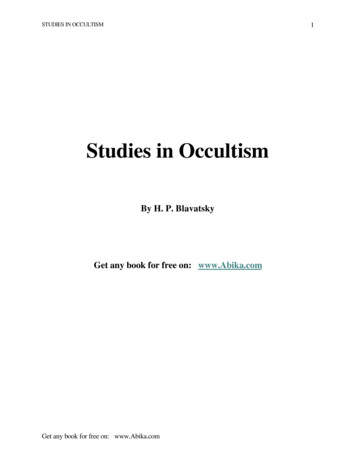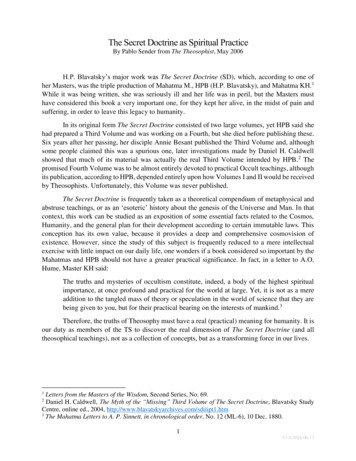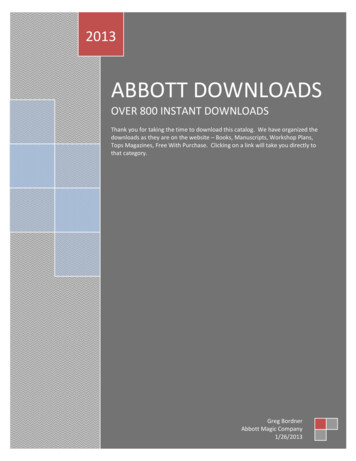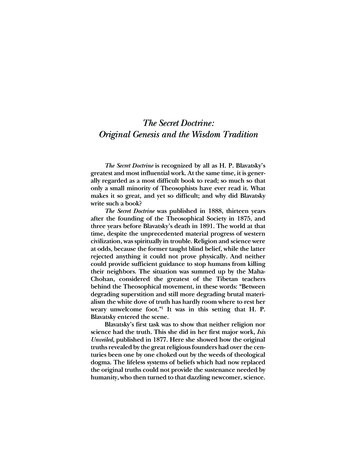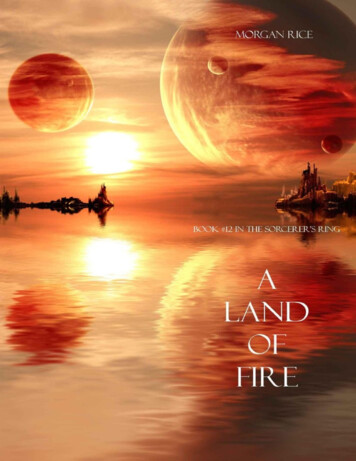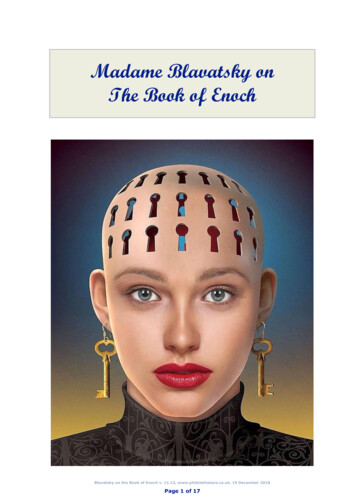
Transcription
Madame Blavatsky onThe Book of EnochBlavatsky on the Book of Enoch v. 11.13, www.philaletheians.co.uk, 19 December 2018Page 1 of 17
BLAVATSKY SPEAKS SERIESTHE BOOK OF ENOCHPART 1 OF 2Part 1 of 2Enoch is the “Son of man,” the first; and, symbolically, the firstsub-Race of the Fifth Root Race.From The Secret Doctrine, II, § XXI, pp. 529-35.THE HISTORY OF THE EVOLUTION of the Satanic myth would not be completeif we omitted to notice the character of the mysterious and cosmopolitanEnoch, variously called Enos, Hanoch, and finally Enoïchion by the Greeks. Itis from his Book that the first notions of the Fallen Angels were taken by the earlyChristian writers.The Book of Enoch is declared apocryphal. But what is an Apocryphon? The very etymology of the term shows that it is simply a secret book, i.e., one that belonged tothe catalogue of temple libraries under the guardianship of the hierophants and initiated priests, and was never meant for the profane. Apocryphon comes from the verbcryptō, κρύπτω, “to hide.” For ages the Enoïchion (the Book of the SEER) was preservedin the “city of letters” and secret works — the ancient Kiryath-Sēpher, later on, De1bir.Some of the writers interested in the subject — especially Masons — have tried toidentify Enoch with Thoth of Memphis, the Greek Hermes, and even with the LatinMercury. As individuals, all these are distinct one from the other; professionally — ifone may use this word, now so limited in its sense — they belong one and all to thesame category of sacred writers, of Initiators and Recorders of Occult and ancient2Wisdom. Those who in the Qur’ān are generically termed the Edris, or the “Learned”(the Initiated), bore in Egypt the name of “Thoth,” the inventor of arts, sciences, writing or letters, of music and astronomy. Among the Jews the Edris became “Enoch,”who, according to Bar-Hebraeus, “was the first inventor of writing,” books, arts, andsciences, the first who reduced to a system the progress of the planets. In Greece he3was called Orpheus, and thus changed his name with every nation. The number4Seven being attached to, and connected with, each of those primitive Initiators, as12Joshua xv, 15Surāt xix3[See “Orpheus’ Hymn to the Muses” and “Orpheus’ legend and works” in our Hellenic and Hellenistic PapersSeries.]4Hanoch, or Enoch means the “Initiator” and “teacher,” as well as the “Son of Man,” Enos (vide Genesis iv, 26),esoterically.Blavatsky on the Book of Enoch v. 11.13, www.philaletheians.co.uk, 19 December 2018Page 2 of 17
BLAVATSKY SPEAKS SERIESTHE BOOK OF ENOCHPART 1 OF 2well as the number 365, of the days in the year, astronomically, it identifies the mission, character, and the sacred office of all those men, but certainly not their personalities. Enoch is the seventh Patriarch; Orpheus is the possessor of the phorminx, the7-stringed lyre, which is the seven-fold mystery of initiation. Thoth, with the sevenrayed Solar Discus on his head, travels in the Solar boat, the 365 degrees, jumpingout every fourth (leap) year for one day. Finally, Thoth-Lunus is the septenary god ofthe seven days, or the week. Esoterically and spiritually, Enoïchion means the “Seerof the Open Eye.”The story about Enoch, told by Josephus, namely, that he had concealed under thepillars of Mercury or Seth his precious rolls or books, is the same as that told ofHermes, “the father of “Wisdom,” who concealed his books of Wisdom under a pillar,and then, finding the two pillars of stone, found the science written thereon. Yet Josephus, notwithstanding his constant efforts in the direction of Israel’s unmeritedglorification, and though he does attribute that science (of Wisdom) to the Jewish1Enoch — writes history. He shows those pillars as still existing during his own time.He tells us that they were built by Seth; and so they may have been, only neither bythe Patriarch of that name, the fabled son of Adam, nor by the Egyptian god of Wisdom — Teth, Set, Thoth, Sat (the later Sat-an), or Hermes, who are all one — but bythe “sons of the Serpent-god,” or “Sons of the Dragon,” the name under which theHierophants of Egypt and Babylon were known before the Deluge, as were their forefathers, the Atlanteans.What Josephus tells us, therefore, must be allegorically true, with the exception ofthe application made of it. According to his version the two famous pillars were entirely covered with hieroglyphics, which, after the discovery, were copied and reproduced in the most secret corners of the inner temples of Egypt, and have thus become the source of its Wisdom and exceptional learning. These two “pillars,”however, are the prototypes of the two “tables of stones” hewn by Moses at the command of the “Lord.” Hence, in saying that all the great adepts and mystics of antiquity — like Orpheus, Hesiod, Pythagoras and Plato — got the elements of their theologyfrom those hieroglyphics, he is right in one sense, and wrong in another; for he errsin accuracy. The Secret Doctrine teaches us that the arts, sciences, theology, andespecially the philosophy of every nation which preceded the last universally known,but not universal Deluge, had been recorded ideographically from the primitive oralrecords of the Fourth Race, and that these were the inheritance of the latter from theearly Third Root-Race before the allegorical Fall. Hence, also, the Egyptian pillars,the tablets, and even the “white Oriental porphyry stone” of the Masonic legend —which Enoch, fearing that the real and precious secrets would be lost, concealed before the Deluge in the bowels of the Earth — were simply the more or less symbolicaland allegorical copies from the primitive Records. The Book of Enoch is one of suchcopies and is a Chaldean, now very incomplete compendium. As already said,Enoïchion means in Greek the “inner eye,” or the Seer; in Hebrew, and with the helpof Masoretic points it means the initiator and instructor, 1%. It is a generic title; besides which his legend is that of several other prophets, Jewish and heathen, withchanges of made-up details, the root-form being the same. Elijah is also taken up1Jewish Antiquities, I, ii, 3Blavatsky on the Book of Enoch v. 11.13, www.philaletheians.co.uk, 19 December 2018Page 3 of 17
BLAVATSKY SPEAKS SERIESTHE BOOK OF ENOCHPART 1 OF 2into Heaven alive; and the astrologer, at the court of Izdubar, the Chaldean Heabani, is likewise raised to heaven by the god Hea, who was his patron, as Jehovahwas of Elijah (whose name means in Hebrew “God-Yāah,” “God is Jehovah”), andagain of Elihu, which has the same meaning. This kind of easy death, or euthanasia,has an esoteric meaning. It symbolises the death of any adept who has reached thepower and degree, as also the purification, which enable him to die only in the physical body and still live and lead a conscious life in his astral body. The variations onthis theme are endless, but the secret meaning is ever the same. The Pauline expres1sion “that he should not see death” — ut non videret mortem — has thus an esotericmeaning, but nothing supernatural in it. The mangled interpretation given of someBiblical hints to the effect that Enoch, “whose years will equal those of the world,” (ofthe Solar year, 365 days), will share with Christ and the prophet Elijah the honoursand bliss of the last advent and of the destruction of Antichrist — signify, esoterically, that some of the great adepts will return in the Seventh Race, when all error willbe made away with, and the advent of TRUTH will be heralded by those Śishtas, theholy “Sons of Light.”The Latin church is not always logical, nor prudent either. She declares the Book ofEnoch an apocryphon, and has gone so far as to claim, through Cardinal Cajetan andother luminaries of the Church, the rejection from the Canon of even the Book ofJude, who, though an inspired apostle, quotes from and thus sanctifies the Book ofEnoch, which is alleged to be an apocryphal work. Fortunately, some of the dogmatics perceived the peril in time. Had they accepted Cajetan’s resolution, they wouldhave been forced to reject likewise the fourth Gospel; as St. John borrows literally2from Enoch, and places in the mouth of Jesus, a whole sentence!Ludolph, the “father of Ethiopic literature,” commissioned to investigate the variousEnochian MSS. presented by N. de Peiresc, the traveller, to the Mazarine Library, declared that “no book of Enoch could exist among the Abyssinians”! Further researches and discoveries worsted his too dogmatic assertion, as all know. Bruce andRuppel found and brought that same work from Abyssinia some years later, andBishop Laurence translated it. But Bruce despised it, and scoffed at its contents; asdid all the rest of the Scientists. He declared it “a Gnostic work,” concerning the ageof giants who pounce upon men to devour them — hence bearing a great resemblance to the Apocalypse. Giants! another fairy-tale.Such, however, was not the opinion of all the best critics. Dr. D.B. von Hanebergplaces the Book of Enoch along with the Third Book of the Maccabees, at the head ofthe list of those whose authority stands the nearest to that of the canonical works.Verily, “where doctors disagree. . . . ”As usual, however, they were all right and all wrong. To accept Enoch as a Biblicalcharacter, a single living man, is like accepting Adam as the first one. Enoch was ageneric title, applied to, and borne by, scores of individuals, at all times and ages,and in every race and nation. This may be easily inferred from the fact that the an12Hebrews xi, 5Vide supra, Section XVIII, sub-section A, p. 482, about the thieves and the robbers.Blavatsky on the Book of Enoch v. 11.13, www.philaletheians.co.uk, 19 December 2018Page 4 of 17
BLAVATSKY SPEAKS SERIESTHE BOOK OF ENOCHPART 1 OF 2cient Talmudists and the teachers of Midrashim are not agreed generally in theirviews about Hanokh, the Son of Jared. Some say Enoch was a great Saint, belovedby God, and taken alive to heaven (i.e., one who reached Mukti or Nirvāna, on earth,as Buddha did and others still do); and others maintain that he was a sorcerer, awicked magician. This shows only that Enoch, or its equivalent, was a term, evenduring the days of the later Talmudists, which meant “Seer,” “Adept in the SecretWisdom,” etc., without any specification as to the character of the title-bearer. WhenJosephus, speaking of Elijah and Enoch, remarks that “it is written in the sacredbooks they [Elijah and Enoch] disappeared, but so that nobody knew that they1died,” it means simply that they had died in their personalities, as Yogis die to thisday in India, or even some Christian monks — to the world. They disappear from thesight of men and die — on the terrestrial plane — even for themselves. A seeminglyfigurative way of speaking, yet literally true.“Hanokh transmitted the knowledge of computing the seasons to Noah,” says the2Midrash Pirqeh R. Eliezer, referring to Hanoch that which others did to HermesTrismegistus, because the two are identical in their esoteric meaning. “Hanokh” in3this case, and his “Wisdom,” belong to the cycle of the Fourth Atlantean Race, and4Noah to that of the Fifth. In this case both represent the Root-Races, the presentone and the one that preceded it. In another sense, Enoch disappeared, “he walkedwith God, and he was not, for God took him,” the allegory referring to the disappearance of the Sacred and Secret knowledge from among men; for “God” (or Yava-Aleim5— the high hierophants, the heads of the colleges of initiated priests ) took him; inother words, the Enochs or the Enoïchions, the Seers and their knowledge and wisdom, became strictly confined to the Secret Colleges of the Prophets, with the Jews,and to the temples with the Gentiles.Interpreted with the help of merely the symbolical key, Enoch is the type of the dualnature of man — spiritual and physical. Hence he occupies the centre of the astronomical cross (given by Éliphas Lévi from a secret work), which is a six-pointed star,“the Adonāi.” In the upper triangle is the Eagle; in the left lower triangle stands thebull; in the right, the lion: while between the bull and the lion, over them and under6the eagle, is the face of Enoch or man. Now the figures on the upper triangle represent the Four Races, leaving out the first — the Chhāyās or Shadows — and the “Sonof Man,” Enos or Enoch, is in the centre, because he stands between the two (theFourth and the Fifth) Races, as he represents the Secret Wisdom of both. These arethe four animals of Ezekiel and of Revelation. The double triangle, however, which7faces it on page 453, in Vol. II of Isis Unveiled — the Hindu Ardhanārī — is by far12Jewish Antiquities, IX, ii, 2Cap. viii3Says the Zohar, (I, 36b): “Hanoch had a book which was identical with the “Book of the generations of Adam’;this is the Mystery of Wisdom.” Cf. Isaac Myer, Qabbalah, pp. 98-99.456Noah is heir to the Wisdom of Enoch; in other words, the Fifth is heir to the Fourth Race.Isis Unveiled, Vol. I, pp. 575, et seq.See the illustrative diagram in Isis Unveiled, Vol. II, p. 452.7[Also known as Ammiappan (mother-father), Ardhanaranari (the half man-woman), Ardhanarinateshvara (theLord of dance who is half-woman), Ardhanarisha (the Lord who is half-woman), Ardhanarishvara (the Lord whoBlavatsky on the Book of Enoch v. 11.13, www.philaletheians.co.uk, 19 December 2018Page 5 of 17
BLAVATSKY SPEAKS SERIESTHE BOOK OF ENOCHPART 1 OF 2the best. For there, only the three (for us) historical races are symbolized; the third,the androgynous, by Ardhanārī; the fourth, symbolized by the strong, powerful lion;and the fifth — the Āryan — by that which is its most sacred symbol to this day, thebull (and the cow).Ardhanari, Symbol of the Hermaphrodite Third Race (Redrawn by Philaletheians EU)A man of great erudition — a French savant — Silvestre de Sacy, finds several mostsingular statements in the Book of Enoch, “worthy of the most serious examination,”he says. For instance, “the author [Enoch] makes the solar year consist of 364 days,is half-woman), Ardhayuvatishvara (the Lord whose half is a young woman), Naranari (man-woman), and bymany other names.]Blavatsky on the Book of Enoch v. 11.13, www.philaletheians.co.uk, 19 December 2018Page 6 of 17
BLAVATSKY SPEAKS SERIESTHE BOOK OF ENOCHPART 1 OF 2and seems to know periods of three, of five, and of eight years, followed by four supplementary days, which, in his system, appear to be those of the equinoxes and solstices.” To which he adds, later on, “I see but one means to palliate them [these “absurdities”]; it is to suppose that the author expounds some fanciful system whichmay have existed BEFORE THE ORDER OF NATURE HAD BEEN ALTERED AT THE PERIOD OF1THE UNIVERSAL DELUGE.”Precisely so; and the Secret Doctrine teaches that that “order of nature” has beenthus altered, and the series of the Earth’s humanities too. For, as the angel Ūriēl tellsEnoch: “Behold, I have showed thee all things, O Enoch; and all things have I revealed to thee. Thou seest the Sun, the Moon, and those which conduct the stars inHeaven, which cause all their operations, seasons, and arrivals to return. In the days2of sinners THE YEARS SHALL BE SHORTENED. . . . the moon shall change its laws, etc.”In those days also, years before the great Deluge that carried away the Atlanteansand changed the face of the whole earth — because “the earth [on its axis] becameinclined” — nature, geologically, astronomically, and cosmically in general, could nothave been the same, just because the Earth had inclined. “And Noah cried with a bitter voice ‘ Hear me, hear me, hear me’; three times. And he said ‘ The earth labours3and is violently inclined; surely, I shall perish with it.’ ”This, by the way, looks like one of those many “inconsistencies,” if the Bible is readliterally. For, to say the least, this is a very strange fear in one who had “found gracein the eyes of the Lord” and been told to build an ark! But here we find the venerablePatriarch expressing as much fear as if, instead of a “friend” of God, he had been oneof the Giants doomed by the wrathful deity. The earth has already inclined, and thedeluge of waters has become simply a question of time, and yet Noah seems to knownothing of his intended salvation.A decree had come indeed; the decree of nature and the Law of Evolution, that theearth should change its race, and that the Fourth Race should be destroyed to makeroom for a better one. The Manvantara had reached its turning point of three and ahalf Rounds, and gigantic physical Humanity had reached the acme of gross materiality. Hence the apocalyptic verse that speaks of a commandment gone forth thatthey may be destroyed, “that their end may be ” (of the race); for they knew truly“every secret of the angels, every oppressive and secret power of the Satans, and every power of those who commit sorcery, as well as of those who make molten images4in the whole earth.”And now a natural question. Who could have informed the apocryphal author of thispowerful vision (to whatever age he may be assigned before the day of Galileo) thatthe Earth could occasionally incline her axis? Whence has he derived such astronomical and geological knowledge if the Secret Wisdom, of which the ancient Rishis andPythagoras had drunk, is but a fancy, an invention of the later ages? Has Enoch read1J.F. Danielo, “Le Livre to la Vision d’Enoch,” Annales de philosophie chrétienne, Nouvelle Série, Tome 17, Décembre 1838, p. 393234The Book of Enoch, lxxxibid., lxvibid., lxv, 6Blavatsky on the Book of Enoch v. 11.13, www.philaletheians.co.uk, 19 December 2018Page 7 of 17
BLAVATSKY SPEAKS SERIESTHE BOOK OF ENOCHPART 1 OF 2prophetically perchance in Frederic Klee’s work on The Deluge these lines: “The position of the terrestrial globe with reference to the Sun has evidently been, in primitivetimes, different from what it is now; and this difference must have been caused by a1 2displacement of the axis of rotation of the Earth.”? ,This reminds one of that other unscientific statement made by the Egyptian priests toHerodotus, namely, that the Sun has not always risen where it arises now, and that3in former times the ecliptic had cut the equator at right angles.There are many such “dark sayings” throughout Purānas, Bible and Mythology; andto the occultist they divulge two facts:1That the ancients knew as well, and better, perhaps, than the moderns do, astronomy, geognosy and cosmography in general; and2That the globe and its behaviour have altered more than once since the primitive state of things. Thus, on the blind faith of his “ignorant” religion, whichtaught that Phaeton, in his desire to learn the hidden truth, made the Sun deviate from its usual course — Xenophanes asserts somewhere that, “the Sun4turned toward another country”; which is a parallel, however slightly more scientific, if as bold, of Joshua stopping the course of the Sun altogether. Yet itmay explain the teaching of the Norse mythology that, before the actual order ofthings, the Sun arose in the South, and its placing the Frigid Zone (Jernsko5ven) in the East, whereas now it is in the North.The Book of Enoch, in short, is a résumé, a compound of the main features of theHistory of the Third, Fourth and Fifth Races; a very few prophecies from the presentage of the world; a long retrospective, introspective and prophetic summary of universal and quite historical events — geological, ethnological, astronomical, and psychic — with a touch of theogony out of the antediluvian records. The Book of thismysterious personage is referred to and quoted copiously in the Pistis Sophia, andalso in the Zohar and its most ancient Midrashim. Origen and Clement of Alexandria6held it in the highest esteem. To say, therefore, that it is a post-Christian forgery is1F.A.G. Klee, Syndfloden (Copenhague, 1842); French tr. as Le Déluge, Paris, 1847. Cf. de Mirville, op. cit., Vol.III, p. 792[Note 26 by Boris de Zirkoff, p. 808: In connection with this alleged statement by Herodotus, consult also pages 332, 368 and 431 of the present Volume II. Bailly’s views are correctly stated, but his reference to Herodotuscannot be easily substantiated. In Herodotus’ History, Book II (Euterpe), 142, occurs the following passage:“Thus the whole sum is eleven thousand three hundred and forty years; in all which time (they said)they had no king who was a god in human form, nor had there been any such thing either before or afterthose years among the rest of the kings of Egypt. Four times in this period (so they told me) the sun rosecontrary to where his wont; twice he rose where he now sets; and twice he set where he now rises; yetEgypt at these times underwent no change, neither in the produce of the river and the land, nor in thematter of sickness and death.” tr. A.D. Godley — ED. PHIL. There is no reference in the above passage to either the equator or the ecliptic. And as far as the period of yearsis concerned, it is too short altogether of any such changes to have taken place, unless the figure given is amere “blind” to hide real esoteric numbers. This whole subject deserves very close attention and should be investigated by competent scholars.]3Bailly, Histoire de l’astronomie ancienne (2nd ed., Paris, 1781), livre VI, § xi, pp. 166-67, where the statement isattributed to Herodotus’ History, Book II (Euterpe), § 1424[See Diels, Fragments de Vorsokratiker, 1922, Fragment 31]5[Norwegian equivalent of the Swedish term Jārnskog, meaning “iron forest” or “forest with iron leaves,” mentioned in Sturri Sturlunson’s Edda. Icelandic term is Jarnvithr.]6[Origen, De princ., IV, I, 35; and Contra Celsum, V, liv]Blavatsky on the Book of Enoch v. 11.13, www.philaletheians.co.uk, 19 December 2018Page 8 of 17
BLAVATSKY SPEAKS SERIESTHE BOOK OF ENOCHPART 1 OF 2to utter an absurdity and to become guilty of an anachronism, since Origen, amongothers, lived in the second century of the Christian era, yet he mentions it as an ancient and venerable work. The secret and sacred name and its potency are well andclearly though allegorically described in the old volume. From the eighteenth to thefiftieth chapter, the Visions of Enoch are all descriptive of the Mysteries of Initiation,one of which is the Burning Valley of the “Fallen Angels.”Perhaps St. Augustine was quite right in saying that the Church rejected the BOOK1OF ENOCH out of her canon owing to its too great antiquity, ob nimiam antiquitatem.There was no room for the events noticed in it within the limit of the 4004 years B.C.2assigned to the world from its creation”!12City of God, Bk. XV, ch. xxiiiSecret Doctrine, II, § XXI, pp. 529-35Blavatsky on the Book of Enoch v. 11.13, www.philaletheians.co.uk, 19 December 2018Page 9 of 17
BLAVATSKY SPEAKS SERIESTHE BOOK OF ENOCHPART 2 OF 2Part 2 of 2From Blavatsky Collected Writings, (THE BOOK OF ENOCH, THE ORIGIN AND THE FOUNDATION OFCHRISTIANITY) XIV pp. 75-86.WHILE MAKING A GOOD DEAL of the Merkābāh, the Jews, or rather theirsynagogues, rejected the Book of Enoch, either because it was not includedfrom the first in the Hebrew Canon, or else, as Tertullian thought, it was1. . . disavowed by the Jews like all other scripture which speaks of Christ.But neither of these reasons was the real one. The Synedrion would have nothing todo with it, simply because it was more of a magic than a purely Kabbalistic work.The present day Theologians of both Latin and Protestant Churches class it amongapocryphal productions. Nevertheless the New Testament, especially in the Acts andEpistles, teems with ideas and doctrines, now accepted and established as dogmasby the infallible Roman and other Churches, and even with whole sentences takenbodily from Enoch, or the “pseudo-Enoch,” who wrote under that name in Aramaic orSyro-Chaldaic, as asserted by Bishop Laurence, the translator of the Ethiopian text.The plagiarisms are so glaring that the author of The Evolution of Christianity, whoedited Bishop Laurence’s translation, was compelled to make some suggestive re2marks in his Introduction. On internal evidence this book is found to have beenwritten before the Christian period (whether two or twenty centuries does not matter). As correctly argued by the Editor, it is. . . either the inspired forecast of a great Hebrew prophet, predicting with miraculous accuracy the future teaching of Jesus of Nazareth, or the Semitic romance from which the latter borrowed His conceptions of the triumphant return of the Son of man, to occupy a judicial throne in the midst of rejoicingsaints and trembling sinners, expectant of everlasting happiness or eternal fire;and whether these celestial visions be accepted as human or Divine, they haveexercised so vast an influence on the destinies of mankind for nearly two thousand years, that candid and impartial seekers after religious truth can no longer delay enquiry into the relationship of the Book of Enoch with the revelation,3or the evolution, of Christianity.The Book of Enoch. . . also records the supernatural control of the elements, through the action ofindividual angels presiding over the winds, the sea, hail, frost, dew, the lightning’s flash and reverberating thunder. The names of the principal fallen angelsare also given, among whom we recognize some of the invisible powers named1Book of Enoch. Archbishop Laurence’s translation. Introduction, p.v.2The Book of Enoch was unknown to Europe for a thousand years, when Bruce found in Abyssinia some copiesof it in Ethiopic; it was translated by Archbishop Laurence in 1821, from the text in the Bodleian Library, Oxford.3op. cit., p. xxBlavatsky on the Book of Enoch v. 11.13, www.philaletheians.co.uk, 19 December 2018Page 10 of 17
BLAVATSKY SPEAKS SERIESTHE BOOK OF ENOCHPART 2 OF 2in the incantations [magical] inscribed on the terra-cotta cups of Hebrew1Chaldee conjurations.We also find on these cups the word “Halleluiah,” showing that. . . a word, with which ancient Syro-Chaldaeans conjured, has become, through2the vicissitudes of language, the Shibboleth of modern “Revivalists.”The Editor proceeds after this to give fifty-seven verses from various parts of theGospels and Acts, with parallel passages from the Book of Enoch, and says:The attention of theologians has been concentrated on the passage in the Epistle of Jude, because the author specifically names the prophet; but the cumulative coincidence of language and ideas in Enoch and the authors of the NewTestament Scripture, as disclosed in the parallel passages which we have collated, clearly indicates that the work of the Semitic Milton was the inexhaustible source from which Evangelists and Apostles, or the men who wrote in theirnames, borrowed their conceptions of the resurrection, judgment, immortality,perdition, and of the universal reign of righteousness, under the eternal dominion of the Son of man. This evangelical plagiarism culminates in the Revelationof John, which adapts the visions of Enoch to Christianity, with modificationsin which we miss the sublime simplicity of the great master of apocalyptic pre3diction, who prophesied in the name of the antediluvian patriarch.In fairness to truth, the hypothesis ought at least to have been suggested, that theBook of Enoch in its present form is simply a transcript — with numerous preChristian and post-Christian additions and interpolations — from far older texts.Modern research went so far as to point out that Enoch is made, in Chapter lxxi, todivide the day and night into eighteen parts, and to represent the longest day in theyear as consisting of twelve out of these eighteen parts, while a day of sixteen hoursin length could not have occurred in Palestine. The translator, Archbishop Laurence,remarks thus:. . . the region in which the author lived must have been situated not lowerthan forty-five degrees north latitude, where the longest day is fifteen hours anda half, nor higher perhaps than forty-nine degrees, where the longest day isprecisely sixteen hours. This will bring the country where he wrote as high upat least as the northern districts of the Caspian and Euxine seas . . . the authorof the Book of Enoch was perhaps a member of one of the tribes which Shalmaneser carried away, and placed “in Halah and in Habor by the river Goshen,4and in the cities of the Medes . . . ”Further on, it is confessed that:It cannot be said that internal evidence attests the superiority of the Old Testament to the Book of Enoch . . . The Book of Enoch teaches the pre-existence of1234op. cit., pp. xx-xxiop. cit., p. xiv, noteop. cit., pp. xxxiv-xxxvop. cit., p. xiiiBlavatsky on the Book of Enoch v. 11.13, www.philaletheians.co.uk, 19 December 2018Page 11 of 17
BLAVATSKY SPEAKS SERIESTHE BOOK OF ENOCHPART 2 OF 2the Son of Man, the Elect One, the Messiah, who “from the beginning existed in1secret, and whose name was invoked in the presence of the Lord of spirits, before the sun and the signs were created.” The author also refers to the “otherPower who was upon Earth over the water on that day” — an apparent refer2ence to the language of Genesis i, 2. [ We maintain that it applies as well to theHindu Nārāyana — the “mover on the waters.”] We have thus the Lord of spirits, the Elect One, and a third Power, seemingly foreshadowing the Trinity [asmuch as the Trimūrti] of futurity; but although Enoch’s ideal Messiah doubtless exercised an important influence on primitive conceptions of the Divinity ofthe Son of man, we fail to identify his obscure reference to another “Power” withthe Trinitarianism of the Alexandrine school; more especially as “angels of pow3er” abound in the visions of Enoch.An Occultist would hardly fail to identify the said “Power.” The Editor concludes hisremarkable reflections by adding:Thus far we learn that the Book of Enoch was published before the Christianera by some great Unknown of Semitic [?] race, who, believing himself to be in4spired in a post-prophetic age, borrowed the name of an antediluvian pa
THE BOOK OF ENOCH PART 1 OF 2 Blavatsky on the Book of Enoch v. 11.13, www.philaletheians.co.uk, 19 December 2018 Page 2 of 17 Part 1 of 2 Enoch is the "Son of man," the first; and, symbolically, the first sub-Race of the Fifth Root Race. From The Secret Doctrine, II, § XXI, pp. 529-35.



